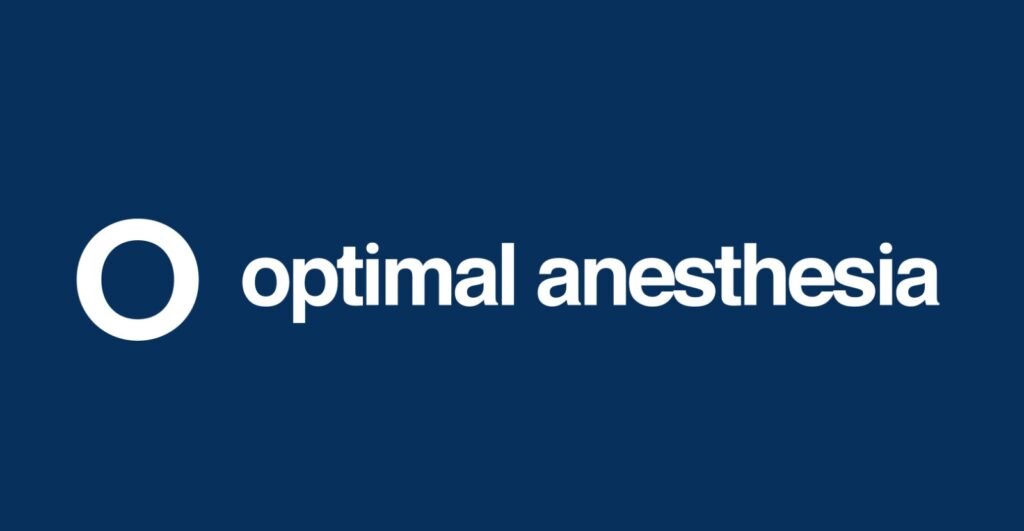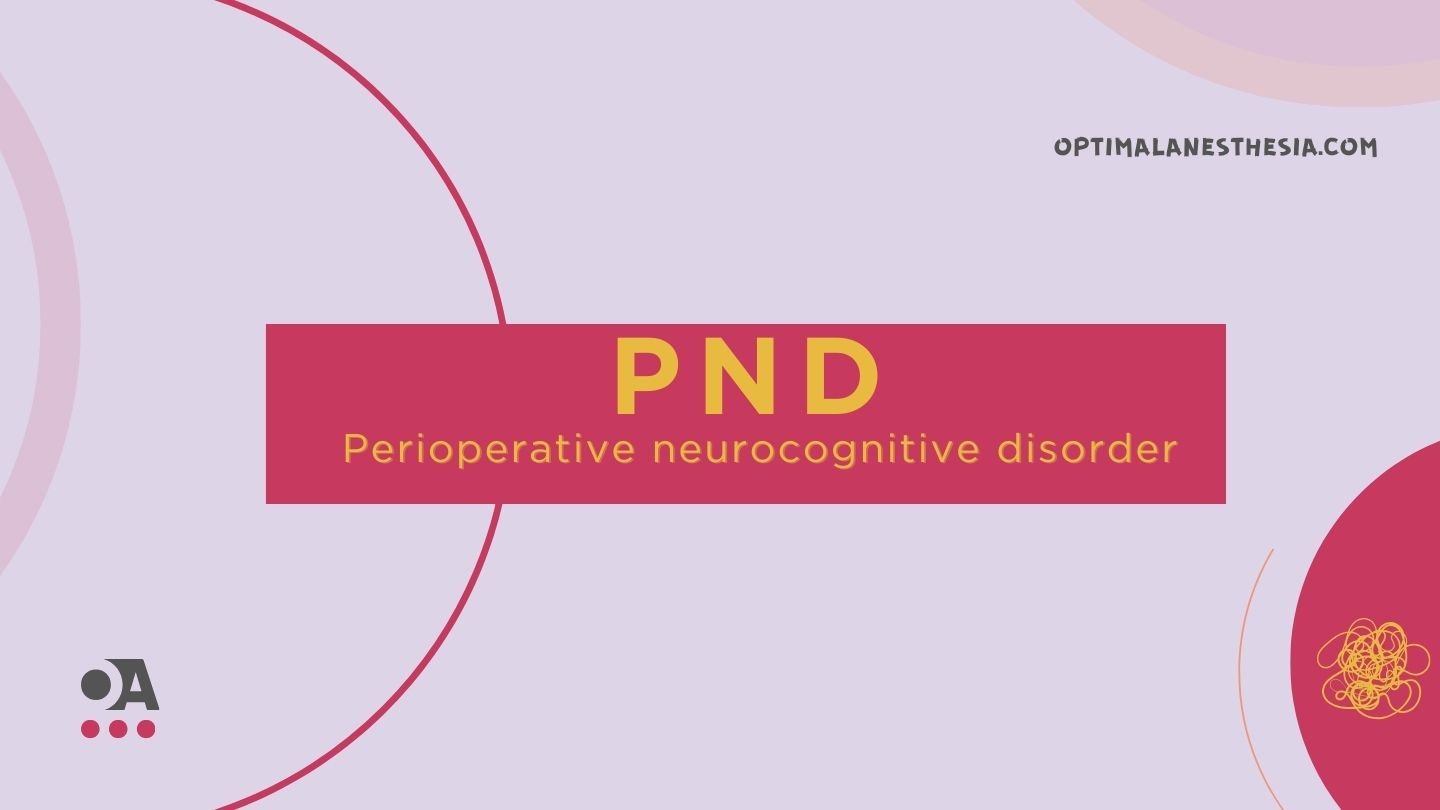Perioperative neurocognitive disorder (PND) is a comprehensive term utilized to encompass alterations in behavior, mood, and cognition that may arise following surgery and anesthesia. This definition is in accordance with the criteria outlined in the Diagnostic and Statistical Manual 5th edition (DSM-V) for neurocognitive disorder (NCD). PND encompasses several distinct conditions, namely preexisting cognitive impairment, postoperative delirium, delayed neurocognitive recovery, and persistent postoperative neurocognitive decline (referred to as NCD [postoperative]).
- Preexisting Cognitive Impairment: A notable proportion of individuals aged 65 and above exhibit mild or major cognitive decline even before undergoing surgical procedures. The identification of such patients is of paramount importance due to their heightened vulnerability to postoperative delirium, enduring cognitive impairment, or the potential development of dementia in the future.
- Postoperative Delirium: Postoperative delirium materializes in two primary forms:
- Emergence Delirium: Brief episodes of delirium, characterized by restlessness, confusion, or excessive drowsiness, occurring shortly after emerging from general anesthesia. This phase, while a normal aspect of the anesthesia recovery process, requires specific management strategies.
- Persistent or Recurrent Delirium: Agitation or delirium that persists beyond the immediate post-anesthesia phase or reoccurs in the post-anesthesia care unit (PACU). In some instances, persistent or recurrent delirium might even arise later during the postoperative period, necessitating prompt evaluation and intervention.
- Postoperative Neurocognitive Impairment: Postoperative cognitive impairment refers to subtler cognitive changes compared to delirium, potentially affecting cognitive abilities and daily functioning. This impairment is categorized into two syndromes based on the onset and severity:
- Delayed Neurocognitive Recovery: Cognitive impairment extending up to 30 days after a surgical procedure, often associated with significant surgeries or complex recovery trajectories.
- Neurocognitive Disorder (Postoperative): Cognitive decline persisting for a year or more following surgery. This disorder can be mild or severe and might endure beyond the one-year timeframe, with the term “postoperative” no longer included in the description.
Notably, preexisting cognitive impairment prior to surgery and the occurrence of postoperative delirium are linked to an increased risk of developing dementia within five years post-surgery. The relationship between anesthesia, surgery, and dementia remains a subject of debate, with some studies suggesting a connection while others opposing it. A study examining individuals aged 68 to 77 found a decreased incidence of Alzheimer’s disease in those who had undergone an appendectomy compared to matched controls.
PATHOPHYSIOLOGY::
The pathophysiologic mechanisms underlying perioperative neurocognitive disorder (PND) are complex and multifactorial, involving a combination of preexisting risk factors, perioperative stressors, inflammatory responses, and potential neurotoxic effects of anesthesia and surgery. While the exact mechanisms are not fully understood, several factors have been proposed to contribute to the development of PND:
- Preexisting Cognitive Vulnerability: Individuals with preexisting cognitive impairment or those who are already at risk for cognitive decline due to age, genetics, or underlying neurodegenerative diseases are more susceptible to PND. These patients have a reduced cognitive reserve, making them more prone to cognitive deficits after surgical stress.
- Perioperative Stress and Inflammation: The surgical process itself introduces physical and psychological stress. This stress triggers the release of stress hormones, such as cortisol, which can impact brain function. Surgical trauma and tissue injury also lead to an inflammatory response. This systemic inflammation can trigger a cascade of events, including the release of pro-inflammatory cytokines, that might affect brain function and contribute to cognitive impairment.
- Anesthesia Effects: Anesthesia can have complex effects on brain function. While anesthesia is intended to induce a controlled state of unconsciousness and amnesia, certain anesthetic agents might interfere with neurotransmitter systems, disrupt neuronal communication, and contribute to cognitive dysfunction. The effects can vary based on the type of anesthesia used and the patient’s susceptibility.
- Cerebral Hypoperfusion and Hypoxia: Surgery and anesthesia can lead to changes in cerebral blood flow and oxygen delivery to the brain. Temporary reductions in blood flow or oxygen levels (hypoperfusion and hypoxia) can impair brain function and contribute to cognitive decline.
- Disruption of Blood-Brain Barrier: The stress response and inflammation associated with surgery and anesthesia can compromise the integrity of the blood-brain barrier. This barrier normally prevents harmful substances in the blood from entering the brain. When disrupted, it might allow inflammatory molecules and other factors to enter the brain, potentially leading to neuronal damage.
- Neurotoxicity: Some anesthetic agents and medications used during surgery have been suggested to have neurotoxic properties, particularly in vulnerable populations like the elderly. These neurotoxic effects might contribute to cognitive dysfunction.
- Postoperative Complications: The occurrence of postoperative complications such as infections, bleeding, or organ dysfunction can further stress the body and exacerbate the risk of cognitive impairment.
- Microvascular Damage: Surgical procedures can lead to microvascular damage, affecting the blood supply to different brain regions. This can disrupt the normal functioning of these brain areas, contributing to cognitive deficits.
Role of Anesthetic Agents and Techniques in Development of Perioperative Neurocognitive Disorder (PND)
In the context of perioperative neurocognitive disorder (PND), the possible impact of anesthetic agents and techniques has been explored, although isolating the effects of anesthesia-related factors from other contributors to neurologic impairment is complex. Factors such as hypoxia, hypotension, stress responses, and hospitalization itself can contribute to neuropathologic changes. Some key considerations for anesthetists are highlighted below:
Depth of Anesthesia:
- Deeper anesthesia has been linked to postoperative delirium, but causation isn’t established.
- The healthy brain is resilient to deep anesthesia, especially in younger individuals.
- Age-adjusted dosing is crucial as anesthesia requirements decrease with age.
- Continuous monitoring of end-tidal anesthetic concentration (ETAC) helps avoid excessive depth.
Neuromonitoring Techniques:
- Electroencephalography (EEG) or processed EEG (e.g., BIS, PSI) can aid in managing anesthesia depth.
- EEG patterns, including burst suppression, are associated with delirium risk.
- Mixed results exist on whether EEG-based monitoring reduces delirium risk.
Blood Pressure Management:
- Extreme blood pressure variations should be avoided to maintain cerebral perfusion.
- Hypotension during surgery, especially prolonged episodes, is linked to delirium risk.
- BP variability rather than absolute hypotension might be associated with risk.
Cerebral Oxygenation Monitoring:
- Cerebral oximetry (rSO2) monitoring helps maintain optimal cerebral oxygenation.
- rSO2 values below 65% are associated with delayed cognitive recovery and delirium.
- Combining cerebral oximetry and EEG monitoring may aid in preventing excessive depth and cerebral desaturation.
Choice of Anesthetic Techniques:
- Neuraxial/regional anesthesia does not consistently decrease delirium risk compared to general anesthesia.
- The choice between inhalation-based and total intravenous anesthesia (TIVA) does not significantly affect delirium incidence.
Anesthetic Agents with Higher Risk:
- Benzodiazepines and gabapentinoids increase delirium risk and should be minimized.
- Opioid dosing is age-adjusted and multimodal pain management is preferred.
- Ketamine’s psychotomimetic effects may manifest as emergence delirium.
Anesthetic Agents with Lower Risk:
- Anti-inflammatory agents like acetaminophen and NSAIDs may reduce delirium risk due to anti-inflammatory and opioid-sparing properties.
- Dexmedetomidine infusion during surgery and postoperatively might mitigate agitated emergence delirium.
- Evidence on inhalation agents’ effects on PND is limited; selection is based on other factors.
These considerations help guide anesthetists in tailoring anesthesia techniques and agent administration to minimize the risk of perioperative neurocognitive disorder, while considering patient-specific factors and the broader perioperative context.
Postoperative Prevention Strategies:
- Various factors can impact the development, worsening, or resolution of PND, including pain, medications, sensory impairments, immobilization, dehydration, abnormal laboratory values, sleep deprivation, and ICU admission.
- Nonpharmacologic measures are important in the immediate postoperative period and include cognitive stimulation, maintaining sensory input (glasses, hearing aids), early mobilization, avoiding dehydration and hypoxia, minimizing medications associated with delirium risk, and controlling postoperative pain.
- Multidisciplinary bundled care guidelines that implement these measures have been shown to reduce the incidence of delirium.
Postoperative Detection:
- Brief postoperative screening tools such as the Confusion Assessment Method (CAM) or CAM-ICU can help identify patients who require further testing for delirium. These tests are easily administered in the postoperative period.
Postoperative Management Strategies:
- Investigate and treat known causes of delirium, which may include medication-induced delirium, medical conditions, and substance intoxication or withdrawal.
- For severe agitation in the PACU, small doses of haloperidol can be used after treating reversible causes.
- In cases of persistent or severe delirium, consider a neurology consult.
- There are no known effective treatments for delayed neurocognitive recovery, and general management involves referral to geriatric neurology/memory clinics if necessary.
Prognosis:
- Delirium at the time of PACU discharge is predictive of worse outcomes, including prolonged hospital stay, discharge to a nursing home, increased mortality, greater decline in functional status, and increased risk of subsequent dementia.
- Older adults experiencing postoperative delirium are more likely to have long-term cognitive and functional impairments, and up to 40% may never return to their preoperative cognitive baseline.
It’s important for anesthesiologists to be aware of these postoperative management and prevention strategies to provide optimal care and minimize the risk of postoperative neurocognitive disorders in their patients.

